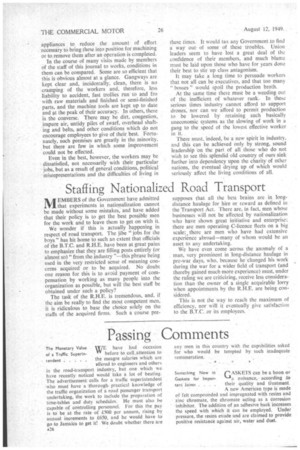Staffing Nationalized Road Transport
Page 28

If you've noticed an error in this article please click here to report it so we can fix it.
MEMBERS of the Government have admitted that experiments in nationalization cannot be made without some mistakes, and have added that their policy is to get the best possible men for the work and to leave them to get on with it.
We wonder if this is actually happening in respect of road transport. The jibe "jobs for the boys" has hit home to such an extent that officials of the B.T.C. and R.H.E. have been at great pains to emphasize that they are filling posts entirely (or almost so) "from the industry "—this phrase being used in the very restricted sense of meaning concerns acquired or to be acquired. No doubt one reason for this is to avoid payment of compensation by working as many people into the organization as possible, but will the best staff be obtained under such a policy?
The task of the R.H.E. is tremendous, and. if the aim be really, to find the most competent men, it is ridiculous to base the choice solely on the staffs of the acquired firms. Such a course pre supposes that all the best brains are in longdistance haulage for hire or reward as defined in the Transport Act. There are, in fact, men whose businesses will not be affected by nationalization who have shown great initiative and enterprise: there are men operating C-licence fleets on a big scale:. there are men who have had extensive experience abroad—many of whom would be an asset to any undertaking.
We have even come across the anomaly of a man, very prominent in long-distance haulage in pre-war days, who, because he changed his -work during the war for a wider field of transport (and thereby gained much more experience) must, under the ruling we are criticizing, receive less consideration than the owner of a single acquirable lorry when appointments by the R.H.E. are being considered.
This is not the way to reach the maximum of efficiency, nor will it eventually give satisfaction to the B.T.C. or its employees.




















































































